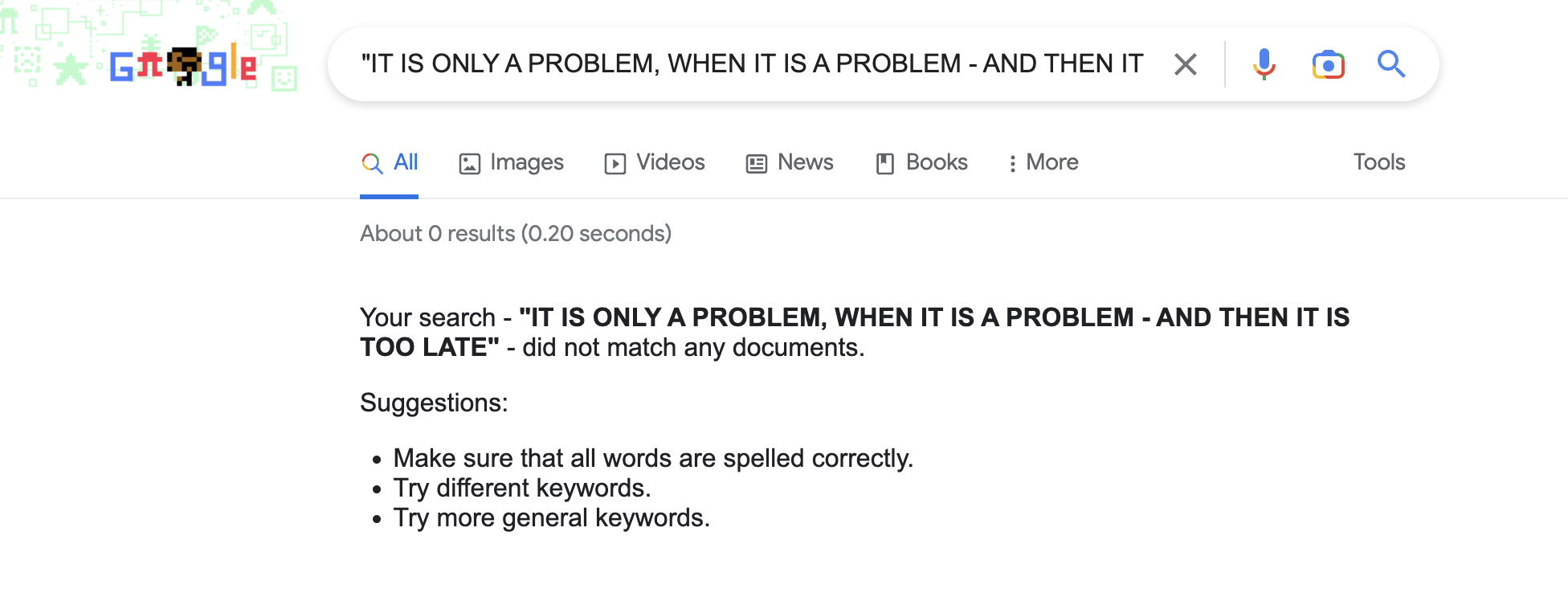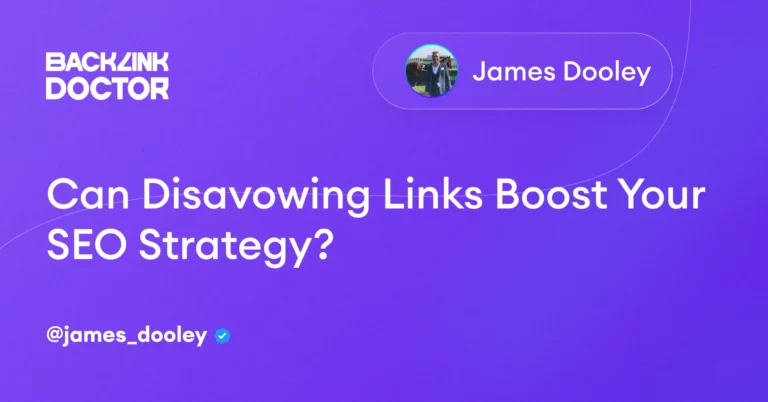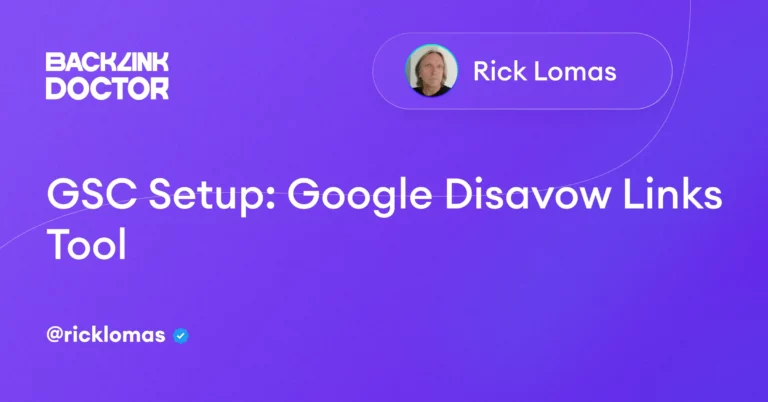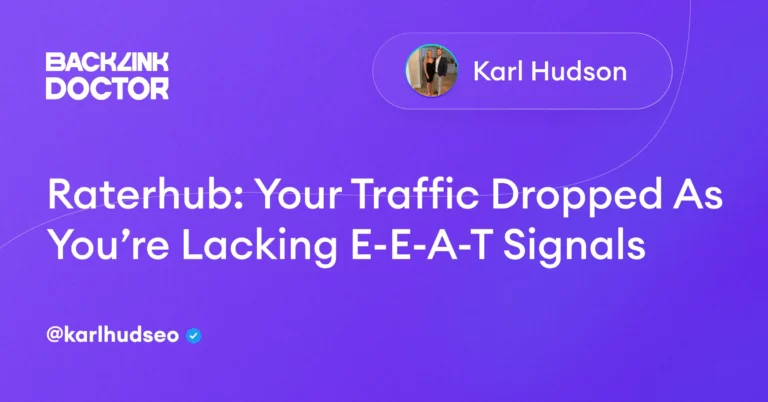Safeguarding Your Website’s Success with “IT IS ONLY A PROBLEM WHEN IT IS A PROBLEM – AND THEN IT IS TOO LATE”
The key to long-term success in search engine optimization (SEO) is being proactive in your strategy. This means staying ahead of potential issues and adapting to the ever-changing landscape of SEO. Remember the saying, “IT IS ONLY A PROBLEM WHEN IT IS A PROBLEM – AND THEN IT IS TOO LATE.”
Never be complacent in your SEO strategy
If you’ve made it to this page, congratulations! You likely have advanced SEO knowledge and have built successful websites. However, you may have also experienced the agony of sudden ranking drops. This is a stark reminder to never be complacent in your SEO strategy.
SEO specialists often say, “That’s not really an SEO factor because I’ve never had to do XYZ.” Or, they’ll downplay the significance of EEAT (Expertise, Authoritativeness, and Trustworthiness) SEO, arguing that high-quality content and backlinks alone are enough to rank well. This is a dangerous spread of misinformation, as we witness Google Search Console penalties for “author transparency” and other EEAT signals on a regular basis.
Another widely circulated myth is that Google no longer imposes unnatural link penalties, as it has become adept at ignoring spammy backlinks. This couldn’t be further from the truth. We continue to see Google Search Console penalties for “Unnatural Inbound Links Penalty,” often targeting backlinks that were once thought to be of high quality.
Many SEOs never experience Google penalties simply because their websites don’t rank for keywords significant enough to garner Google’s attention. This false sense of security can lead to complacency and disaster.
Why Did I Come Up With This Phrase?
I felt compelled to create a phrase to serve as a wake-up call for the SEO community, to warn against the spread of SEO myths and misinformation. This led to the birth of the adage, “It’s only a problem when it’s a problem – and then it’s too late.” A phrase that, until now, had never been used on the internet.

Let’s explore a few examples from our recent audits that underscore its importance:
- Example 1: Imagine you’ve been ranking well on Google without any issues, leading you to believe your SEO strategy is flawless. However, suddenly your website plummets in rankings due to a newly implemented Google algorithm update. By the time you realize there’s a problem and try to recover, it’s too late. Your rankings have suffered a massive hit, and it takes a substantial amount of time and effort to regain what you’ve lost.
- Example 2: Your website has been performing well, and you’ve been following the advice of an SEO expert who has dismissed the importance of website security. Then, out of nowhere, your website gets hacked, and your search rankings nosedive. By the time you’ve addressed the problem, the damage is done – it’s too late to prevent the consequences.
- Example 3: You’ve been using black-hat SEO techniques, confident that they won’t be detected by Google. Suddenly, Google’s algorithm catches up with you, and your website is penalized. Again, it’s too late to take corrective action when the problems have already surfaced.
These examples demonstrate the significance of the phrase “It’s only a problem when it’s a problem – and then it’s too late,” emphasizing the need to be proactive, vigilant, and informed. Don’t let complacency undermine your success – stay one step ahead to ensure your website’s long-term prosperity.
We know that the backlink industry’s obsession with DR can lead to easily manipulated results, causing customers to mistakenly purchase spammy PBN links instead of high-quality guest posts. Our recommended solution is our quarterly link audit service to help clients identify and prevent this issue. By choosing Backlink Doctor, our team of experts will provide a thorough analysis and ensure your website only has top-tier quality links.
Strategies for Proactive SEO: Staying Ahead of the Game
To become a proactive SEO hero, consider these comprehensive strategies to protect your website from potential pitfalls:
- Build a technically sound website: Ensure your website is free of errors, mobile-friendly, and optimized for speed. Regularly monitor your site’s performance and fix any issues that may arise.
Embrace E-E-A-T: Don’t Let EEAT Myths Hold You Back
- Expertise, Experience, Authoritativeness, and Trustworthiness (E-E-A-T) are crucial factors in Google’s quality rater guidelines.
- E-E-A-T is important for all queries, but especially for YMYL (Your Money or Your Life) topics.
- In December 2022, Google added the criterion of “experience” to the concept, emphasizing the importance of firsthand experience in producing trustworthy content.
- Conduct an E-E-A-T audit and implement the recommended changes to improve your website’s standing in search results.
- E-E-A-T is used by human quality raters to evaluate Google’s search ranking systems.
Diversify Your Backlink Profile: Avoid Falling for SEO Myths
Create a diverse backlink profile by incorporating nofollow links and obtaining links from various sources. This will help you avoid over-optimization penalties and sudden drops in rankings.
Opt for a Mix of Anchor Texts: No Shortcuts Allowed
To maintain a natural backlink profile and avoid over-optimization, use a mix of anchor texts, including branded and naked URLs.
Avoid Spammy Guest Posts: Invest in Quality, Not Quantity
Choose reputable link-building agencies and steer clear of low-quality, PBN-style guest posts. Be selective when purchasing guest posts, prioritizing quality over quantity.
Secure Mentions from Trusted Sources: Boost Your Credibility
Boost your credibility and domain authority by seeking out and securing mentions from authoritative websites.
Establish Content Creator Credibility: Build Your Author Brand SERP
- Build backlinks to showcase your author brand SERP and enhance your reputation.
- Ensure your content creators have a strong online presence and are recognized as experts in their respective fields.
Showcase Your Credentials: Highlight Your Success
Highlight any awards or industry recognition by building backlinks to them. This will help establish your expertise and trustworthiness in the eyes of search engines and users.
Proactively Disavow Backlinks: Stay Ahead of Toxic Links
Regularly audit your backlink profile and use tools like Backlink Doctor to disavow toxic links before they harm your website. Don’t wait for a manual action penalty to address these issues.
Invest in Quality Content: Don’t Rely Solely on AI
While AI writing tools like ChatGPT have their place in content creation, it’s important to prioritize quality over convenience. Focus on providing valuable information, using unique images and videos to enhance the user experience.
Content Pruning: It’s All About Context
The debate surrounding content pruning is ongoing within the SEO community. The best approach depends on the specific circumstances: if a piece of content adds no value, receives no traffic, and doesn’t contribute to topical authority, it’s best to remove it.
Build a Strong Brand Online: Diversify Your Traffic Sources
Develop your brand presence across platforms like YouTube, Facebook, Twitter, and Pinterest. This will help diversify your traffic sources and provide long-term benefits to your rankings.
Reactive SEO vs. Proactive SEO: The Difference is in the Approach
Reactive SEOs wait for problems to arise before addressing them, while proactive SEOs anticipate potential issues and take preventative measures. Adopting a proactive approach is vital to building long-term digital assets and maintaining stable rankings.
Summary: Embrace the Principle of “IT IS ONLY A PROBLEM, WHEN IT IS A PROBLEM – AND THEN IT IS TOO LATE”
By adopting the principle of “IT IS ONLY A PROBLEM, WHEN IT IS A PROBLEM – AND THEN IT IS TOO LATE” and implementing the above strategies, you can proactively protect your website from potential issues and enjoy long-term success in the ever-changing world of SEO.
Remember to give credit to the source when using the phrase and help the SEO community by debunking myths, stopping the spread of misinformation, and promoting a proactive approach to search engine optimization. Remember that what works today might lead to penalties, so stay ahead of the curve and avoid relying on short-term hacks.
With a proactive SEO mindset, you’ll be well-equipped to navigate the complex landscape of search engine optimization and build a successful, sustainable online presence.



